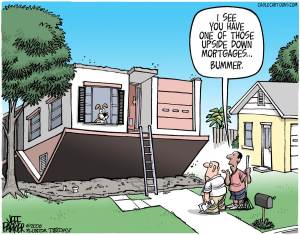Something very important is happening on December 31st of this year – something that might impact your life, or the lives of your friends, family or co-workers.
What am I talking about?
The expiration of the Mortgage Forgiveness Debt Relief Act. The expiration of the Mortgage Forgiveness Debt Relief Act. As your real estate expert, I talked about the Act in a previous Coffee Break Newsletter.
Oddly enough, many homeowners (including those affected by the Act) are unaware of its existence, or of its ticking clock.
The Mortgage Forgiveness Debt Relief Act applies to debt relief “forgiven” between January 1, 2007 and December 31, 2012. At this point in time, it does not appear the Act will be extended.
What’s really at stake? Money!
Let’s take a step backwards to put this in perspective.
Debt “relief” comes about when a lender “forgives” debt owed by a borrower, as can happen with a short sale, foreclosure, or other type of loan “workout”. Ordinarily, that forgiven amount is taxable. However, under the Act, the borrower’s need to pay taxes on the amount of the forgiven debt is eliminated.
Of course, there are caveats that come along with this tax relief. For example, the debt must be related to a principal residence. In addition, the total amount of the debt can’t exceed the borrower’s original mortgage loan … plus the cost of improvements made to the home.
The implications of this tax relief are huge in dollars and cents! Take a look at an example.
In 2006, Mary Jones bought a home for $375,000 and took out a mortgage of $265,000. This month Mary is relocated across the country for work and must sell her home. Her current mortgage balance is $237,000. Luckily for Mary, her lender is a bank that is willing to work with her on a short sale … and she is lucky enough to find a buyer.
Mary and her buyer agree to a sales price of $218,000. However, that amount falls short of what Mary needs to pay off her mortgage, and pay closing costs – all of which is estimated to come to $227,620. Since Mary does not have enough money to bring to the closing table, Mary’s lender agrees to the short sale, forgiving debt in the amount of $9,260.
Prior to the Act, Mary would have been required to declare the $9,260 as income, and pay taxes on it. Under the current provisions of the Act, taxes on Mary’s $9,260 in relief are forgiven. For individuals in a 20% tax bracket, that’s almost $2,500 in tax savings!
And owners of high-end homes – defaults of which are on the rise — could be looking at very substantial tax breaks, depending on the amount of debt forgiven.
Which leads to several questions my clients have repeatedly raised about the Act:
- What is the maximum amount of debt relief under the Act? Up to $2 million may be forgiven for married couples ($1 million if single or if married but filing separately); of course, this must be for a principal residence. If there is debt forgiven above this amount the borrower is taxed at ordinary income rates.
- Does the Act apply to cars, boats, second homes, investment properties, credit cards, or other debt? Not under this provision. Only debt relief for a principal residence applies under the Act, however, bankruptcy debt relief is non-taxable, and that is sometimes true for insolvency as well.
- Do I have to report the forgiven debt, since I won’t be paying taxes on it? Yes! See the IRS and/or your tax professional for additional details.
I’m not suggesting that you hurry up and default on your mortgage loan so you can take advantage of the Act. However, it is important that you understand the implications of the Act and how it may affect you.
I encourage you to contact qualified professionals (such as attorneys or Certified Public Accountants) who can assist you with this program. I have names of trusted service providers. I also suggest you visit the IRS site for information on the Mortgage Forgiveness Debt Relief Act, which can be found on the IRS’s website. I used information from that site, in addition to information provided by NAR in preparing this blog post for you.
Most people are not aware of the Act’s existence, and pending expiration. Call me at 425-330-0663 for more information on this important and expiring topic. Or just click here!




 d as it’s going to get. If the lender forecloses, it will incur additional costs and delays, and might have to evict its borrower.
d as it’s going to get. If the lender forecloses, it will incur additional costs and delays, and might have to evict its borrower.